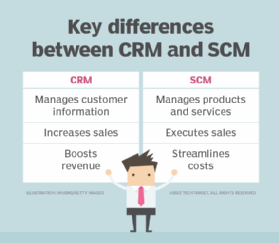
What's the difference between SCM and CRM?
CRM platforms track customer interactions, whereas SCM platforms track materials and product shipments. Tech buyers should know how these platforms differ before making a purchase.
While CRM platforms can help organizations drive sales, a supply chain management platform helps land those sales.
CRM and supply chain management (SCM) platforms both organize massive amounts of data into searchable, functionable and actionable information. However, these platforms track different types of information. While many organizations use both a CRM and an SCM, some companies may need just one. To ensure business leaders purchase the right software for their organization, they should know the similarities and differences between these platforms.
Defining CRM and SCM
CRM platforms establish direct lines of communication between organizations and their customers. They also collect and organize customer information throughout the customer lifecycle.
CRM platforms collect customer data, like contact information, previous sales interactions, personality traits and potential for added sales opportunities. Employees in sales, marketing and customer service can then quickly analyze, reference and use this information to personalize interactions with leads and existing customers.
CRM platforms help organizations do the following:
- use personalized interactions to retain customers; and
- drive new sales opportunities.
Much like CRM platforms, which track customer interactions and streamline sales processes, SCM platforms track products and streamline supply chain processes. Supply chains can look dramatically different from one organization to the next, but in general, SCM platforms include the following features:
- order processing and synchronization with partners;
- product inventory management;
- sales and product distribution, logistics and tracking;
- supplier opportunities and relationship tracking; and
- supply and demand forecasting.
Key differences between CRM and SCM
Although CRM and SCM platforms both help organizations deliver goods and services to customers, the individual processes that each platform manages occur at different parts of the customer lifecycle.
CRM and SCM platforms differ in the following ways.

1. Customer management vs. product management
CRM software and its associated processes help organizations apply marketing strategies to obtain and maintain customer relationships. These platforms also rely on communications tools to facilitate interactions between agents and customers. Organizations often integrate CRM software with unified communications, contact center platforms and omnichannel capabilities so customers and sales staff can interact regarding sales questions, problem resolution and upselling opportunities.
Many CRM platforms also have reporting and data analytics features, which track sales and marketing efforts, as well as ROI in customer retention and lead generation programs.
SCM platforms, on the other hand, manage product and service delivery. They collect supply chain data and use it to forecast future sales and track real-time product inventory and sales locations. This data-driven approach to SCM helps organizations manage inventory checks, logistical information, delivery dates and product supply controls.
2. Driving sales vs. completing sales
CRM platforms help organizations drive new sales, while SCM platforms focus on improving sales processes. SCM platforms can speed up product delivery times, overcome bottlenecks and automate supply chain processes.
3. Revenue generation vs. cost streamlining
Organizations implement CRM platforms to create more revenue generation opportunities. Conversely, SCM platforms help organizations simplify areas of the supply chain, which can reduce costs and deliver products in a timely manner.
How to choose between CRM and SCM platforms
The type and structure of an organization largely determine whether it requires a CRM platform, SCM platform or both. Organizations in highly competitive markets or that maintain many customer relationships need a CRM platform and typically have large marketing departments, intricate sales incentives programs and contact centers.
Alternatively, organizations in niche markets with few competitors or those that don't frequently create and monitor sales incentive programs may not benefit from CRM software. Organizations that prioritize delivering a product or service quickly and cost-effectively may see a larger ROI if they invest in SCM platforms.
However, many organizations require both CRM and SCM tools. Some products natively integrate CRM and SCM features together, but organizations can also integrate different products through APIs. Certain APIs can let CRM and SCM platforms share data with each other for an end-to-end view of the entire customer lifecycle.








